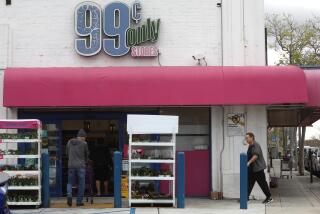Column: Groupon, once a high-flier, lives down to investors’ expectations
- Share via
Nothing is more instructive -- and fun! -- than going back in time to a high-flying start-up’s initial public offering and comparing the expectations then with the realities today.
Say hello to Groupon, which was a quintessential high-tech consumer play on the day of its IPO, exactly four years ago Wednesday. That day, Groupon’s shares soared 31% above their opening price. The IPO raised $700 million for the Chicago-based company, and ranked as the second-largest tech IPO in history, behind only Google’s $1.7-billion offering in 2004. Groupon was valued at $16 billion, more than such retailers as Best Buy and Whole Foods.
On Wednesday, Groupon lost nearly 27% to close at $2.97. “Obviously this is not your fairy-tale first day on the job,” Rich Williams, who was promoted Tuesday from chief operating officer to CEO, told CNBC.
Obviously this is not your fairy-tale first day on the job.
— New Groupon CEO Rich Williams
What happened? On Tuesday, the company reported a $27.6-million loss for the third quarter ended Sept. 30. Gross billings, revenue and profits were all down from a year earlier.
All this for a company that hawked online discount deals. I compared its wares just before its IPO to high-tech versions of “those fat coupon books offering discounts at local shops that are still flogged door-to-door as school and church fundraisers.”
The company had leaped into public consciousness with a couple of eye-catching deals, including a half-off coupon for the Gap. What may not have been so obvious to starry-eyed IPO investors was that its business model could be easily replicated by rivals such as LivingSocial, which competed by offering a half-off coupon for Amazon, which owned a huge stake in that company.
Another emergent issue was that Groupon’s accounting methods were, shall we say, colorful. It reported a non-GAAP home-grown metric that excluded online marketing expenses and stock-based compensation; that allowed it to report profits when actually, by real-world accounting standards, it was losing money. (Eric Savitz of Forbes labeled this “the Bubble 1.0 approach to accounting.”)
An SEC inquiry followed, along with signs that consumer demands for refunds were running ahead of expectations and that many merchants who offered cut-price deals through Groupon were unhappy that their expensive come-ons weren’t yielding lots of long-term customers.
Investors have been souring on Groupon for some time -- in fact, pretty much since 2012. This week’s signs that things aren’t improving plainly caused many holdouts to give up.
Is there a lesson for today’s crop of high-tech “unicorns” valued north of $1 billion based on a hot story? You can bet on it. But you can also bet that overconfidence hasn’t been washed out of the start-up culture quite yet.
Shortly before the Groupon IPO, I described its founders’ decision to turn down a reported $6-billion acquisition offer from Google in favor of the public offering as “either as the peak of early 21st century hubris or a heck of a canny move.” They should have taken the money.
Keep up to date with the Economy Hub. Follow @hiltzikm on Twitter, see our Facebook page, or email [email protected]
More to Read
Inside the business of entertainment
The Wide Shot brings you news, analysis and insights on everything from streaming wars to production — and what it all means for the future.
You may occasionally receive promotional content from the Los Angeles Times.











